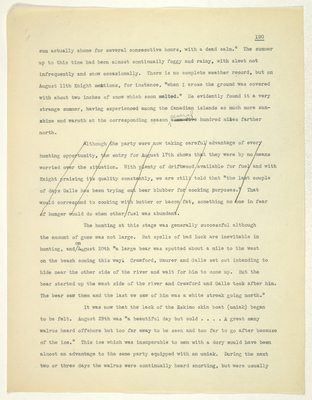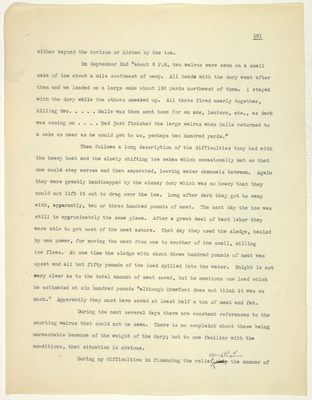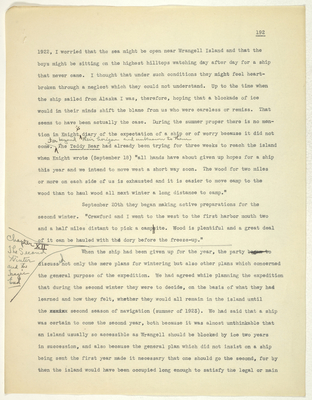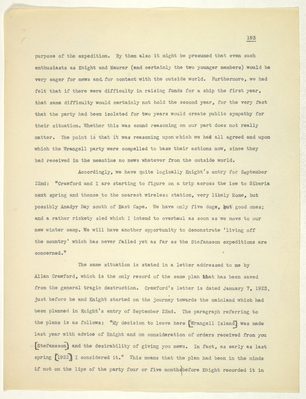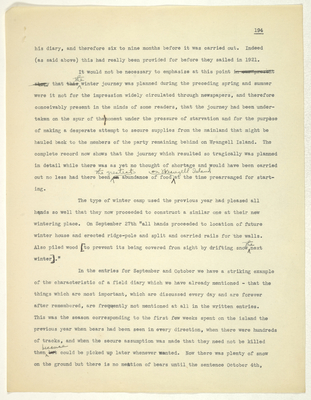Pages
stefansson-wrangel-09-29-041
190
sun actually shone for several consecutive hours, with a dead calm." The summer up to this time had been almost continually foggy and rainy, with sleet not infrequently and snow occasionally. There is no complete weather record, but on August 11th Knight mentions, for instance, "when I arose the ground was covered with about two inches of snow which soon melted." He evidently found it a very strange summer, having experienced among the Canadian islands so much more sunshine and warmth at the corresponding season several even five hundred miles farther
north.
Although the party were now taking careful advantage of every hunting opportunity, the entry for August 17th shows that they were by no means worried over the situation. With plenty of driftwood available for fuel and with Knight praising its quality constantly, we are still told that "the last couple of days Galle has been trying out bear blubber for cooking purposes." That would correspond to cooking with butter or bacon fat, something no one in fear of hunger would do when other fuel was abundant."
The hunting at this stage was generally successful although the amount of game was not large. But spells of bad luck are inevitable in hunting, and on August 20th "a large bear was spotted about a mile to the west on the beach coming this way. Crawford, Maurer and Galle set out intending to hide near the other side of the river and wait for him to come up. But the bear started up the west side of the river and Crawford and Galle took after him. The bear saw them and the last we saw of him was a white streak going north."
It was now that the lack of the Eskimo skin boat (umiak) began to be felt. August 29th was "a beautiful day but cold . . . . A great many walrus heard offshore but too far away to be seen and too far to go after because of the ice." This ice which was insuperable to men with a dory would have been almost an advantage to the same party equipped with an umiak. During the next two or three days the walrus were continually heard snorting, but were usually
stefansson-wrangel-09-29-042
191
either beyond the horizon or hidden by the ice.
On September 2nd "about 6 P.M. two walrus were seen on a small cake of ice about a mile southeast of camp. All hands with the dory went after them and we landed on a large cake about 150 yards northwest of them. I stayed with the dory while the others sneaked up. All three fired nearly together, killing two. . . . . Galle was then sent home for an axe, lantern, etc., as dark was coming on . . . . Had just finished the large walrus when Galle returned to a cake as near as he could get to us, perhaps two hundred yards."
Then follows a long description of the difficulties they had with the heavy boat and the slowly shifting ice cakes which occasionally met so that one could step across and then separated, leaving water channels between. Again they were greatly handicapped by the clumsy dory which was so heavy that they could not lift it out to drag over the ice. Long after dark they got to camp with, apparently, two or three hundred pounds of meat. The next day the ice was still in approximately the same place. After a great deal of hard labor they were able to get most of the meat ashore. That day they used the sledge, hauled by man power, for moving the meat from one to another of the small, milling ice floes. At one time the sledge with about three hundred pounds of meat was upset and all but fifty pounds of the load spilled into the water. Knight is not very clear as to the total amount of meat saved, but he mentions one load which he estimated at six hundred pounds "although Crawford does not think it was so much." Apparently they must have saved at least half a ton of meat and fat.
During the next several days there are constant references to the snorting walrus that could not be seen. There is no complaint about these being unreachable because of the weight of the dory; but to one familiar with the conditions, that situation is obvious.
During my difficulties in financing the relief operation ship the summer of
stefansson-wrangel-09-29-043
192
1922, I worried that the sea might be open near Wrangell Island and that the boys might be sitting on the highest hilltops watching day after day for a ship that never came. I thought that under such conditions they might feel heartbroken through a neglect which they could not understand. Up to the time when the ship sailed from Alaska I was, therefore, hoping that a blockade of ice would in their minds shift the blame from us who were careless or remiss. That seems to have been actually the case. During the summer proper there is no mention in Knight's diary of the expectation of a ship or of worry because it did not come. Far beyond their horizon and unknown to them The Teddy Bear had already been trying for three weeks to reach the island when Knight wrote (September 18) ‘'all hands have about given up hopes for a ship this year and we intend to move west a short way soon. The wood for two miles or more on each side of us is exhausted and it is easier to move camp to the wood than to haul wood all next winter a long distance to camp."
September 20th they began making active preparations for the second winter. "Crawford and I went to the west to the first harbor mouth two and a half miles distant to pick a camp|site. Wood is plentiful and a great deal of it can be hauled with the dory before the freeze-up."
Chapter XII The Second Winter and the Tragic End
When the ship had been given up for the year, the party began to discussed not only the mere plans for wintering but also other plans which concerned the general purpose of the expedition. We had agreed while planning the expedition that during the second winter they were to decide, on the basis of what they had learned and how they felt, whether they would all remain in the island until the xxxxxx second season of navigation (summer of 1923). We had said that a ship was certain to come the second year, both because it was almost unthinkable that an island usually so accessible as Wrangell should be blocked by ice two years in succession, and also because the general plan which did not insist on a ship being sent the first year made it necessary that one should go the second, for by then the island would have been occupied long enough to satisfy the legal or main
stefansson-wrangel-09-29-044
193
purpose of the expedition. By then also it might be presumed that even such enthusiasts as Knight and Maurer (and certainly the two younger members) would be very eager for news and for contact with the outside world. Furthermore, we had felt that if there were difficulty in raising funds for a ship the first year, that same difficulty would certainly not hold the second year, for the very fact that the party had been isolated for two years would create public sympathy for their situation. Whether this was sound reasoning on our part does not really matter. The point is that it was reasoning upon which we had all agreed and upon which the Wrangell party were compelled to base their actions now, since they had received in the meantime no news whatever from the outside world.
Accordingly, we have quite logically Knight's entry for September 22nd: "Crawford and I are starting to figure on a trip across the ice to Siberia next spring and thence to the nearest wireless station, very likely Nome, but possibly Anadyr Bay south of East Cape. We have only five dogs, but good ones; and a rather rickety sled which I intend to overhaul as soon as we move to our new winter camp. We will have another opportunity to demonstrate 'living off the country' which has never failed yet as far as the Stefansson expeditions are concerned."
The same situation is stated in a letter addressed to me by Allan Crawford, which is the only record of the same plan that has been saved from the general tragic destruction. Crawford's letter is dated January 7, 1923, just before he and Knight started on the journey towards the mainland which had been planned in Knight's entry of September 22nd. The paragraph referring to the plans is as follows: "My decision to leave here [Wrangell Island] was made last year with advice of Knight and on consideration of orders received from you [Stefansson] and the desirability of giving you news. In fact, as early as last spring [1922] I considered it." This means that the plan had been in the minds if not on the lips of the party four or five months|before Knight recorded it in
stefansson-wrangel-09-29-045
194
his diary, and therefore six to nine months before it was carried out. Indeed (as said above) this had really been provided for before they sailed in 1921.
It would not be necessary to emphasize at this point in our present story that this the winter journey was planned during the preceding spring and summer were it not for the impression widely circulated through newspapers, and therefore conceivably present in the minds of some readers, that the journey had been undertaken on the spur of the|moment under the pressure of starvation and for the purpose of making a desperate attempt to secure supplies from the mainland that might be hauled back to the members of the party remaining behind on Wrangell Island. The complete record now shows that the journey which resulted so tragically was planned in detail while there was as yet no thought of shortage and would have been carried out no less had there been the greatest an abundance of food on Wrangell Island at the time prearranged for starting,
The type of winter camp used the previous year had pleased all hands so well that they now proceeded to construct a similar one at their new wintering place. On September 27th "all hands proceeded to location of future winter house and erected ridge-pole and split and carried rails for the walls. Also piled wood [to prevent its being covered from sight by drifting snow the next winter]."
In the entries for September and October we have a striking example of the characteristic of a field diary which we have already mentioned - that the things which are most important, which are discussed every day and are forever after remembered, are frequently not mentioned at all in the written entries.
This was the season corresponding to the first few weeks spent on the island the previous year when bears had been seen in every direction, when there were hundreds of tracks, and when the secure assumption was made that they need not be killed then because but could be picked up later whenever wanted. Now there was plenty of snow
on the ground but there is no mention of bears until the sentence October 4th,
